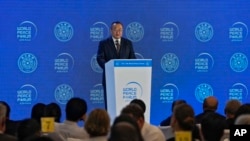U.S. Secretary of State Antony Blinken held talks with veteran Chinese diplomat Liu Jianchao on Friday morning, a day before Taiwan's presidential and legislative elections — a test for efforts to stabilize tensions between the United States and China.
Washington has cautioned Beijing against using the elections as a pretext for instability in the Taiwan Strait.
In keeping with a long-standing precedent, the United States is sending a bipartisan delegation to Taiwan after the election.
The U.S. delegation includes members of the Congressional Taiwan Caucus; Laura Rosenberger, who chairs the American Institute in Taiwan; and former officials who served under both Democratic and Republican administrations.
Direct message
Liu, who heads the Chinese Communist Party's International Liaison Department, is the highest-ranking Chinese official to visit the United States since U.S. President Joe Biden and Chinese President Xi Jinping met on the sidelines of the Asia-Pacific Economic Cooperation summit south of San Francisco on November 15.
A source familiar with the meeting said that in diplomacy, it is crucial to convey messages directly to China on "the importance of peace and stability in the region ahead of the Taiwan elections, and in light of recent PRC provocations in the South China Sea."
In a statement, the State Department said Blinken "reiterated the importance of maintaining peace and stability across the Taiwan Strait and in the South China Sea."
"The two sides had a constructive discussion on a range of bilateral, regional and global issues, including areas of potential cooperation and areas of difference," said State Department spokesperson Matthew Miller.
"The secretary emphasized the importance of resolving the cases of American citizens who are wrongfully detained or subject to exit bans in China and raised U.S. concerns about PRC human rights abuses," Miller said in a statement late Friday.
The sending of the U.S. delegation to Taipei after the elections is perceived as an effort to preempt a strong reaction from Beijing.
A Chinese spokesperson repeated Beijing's assertion on Friday that Taiwan's elections are China's internal affairs, and that China opposes any form of official contact between the U.S. and Taiwan.
China claims sovereignty over the self-ruled democracy. The U.S. acknowledges but has never endorsed Beijing's position.
The winner of Taiwan's presidential election will be inaugurated on May 20. The transition period in the coming months is seen as sensitive in cross-strait relations.
Liu is seen as a leading contender to be China's next foreign minister, according to some media reports and analysts.
It is unusual for the minister of the International Liaison Department, a unit under the Communist Party's Central Committee, to visit the United States, according to Bonnie Glaser, managing director of the Indo-Pacific Program at the German Marshall Fund.
"The most likely explanation for this visit, and the reason that he is being received by Blinken, is that Liu is likely to be China's next foreign minister. The visit provides an opportunity for the U.S. to take his measure in advance of his formal appointment, likely at the upcoming National People's Congress" in early March, Glaser told VOA.
In a blog post by the Washington-based Center for Strategic and International Studies, or CSIS, Liu was described as China's "shadow foreign minister."
"China still has the same leader, Xi Jinping, whose overall views and vision have not changed. Shifts in other personnel or a more engaging tone may not make a huge difference in the content of China's foreign policy," said the CSIS blog.
Senior U.S. officials attending Friday's meeting include the State Department's top diplomat on East Asian and Pacific affairs, Daniel Kritenbrink, and its China coordinator, Mark Lambert.
World Economic Forum
Communication between the world's two largest economies will continue after Taiwan's elections, as senior U.S. and Chinese officials are to attend next week's World Economic Forum in Davos, Switzerland. Blinken and Chinese Premier Li Qiang will attend the annual economic meetings at the Swiss mountain resort.
Blinken's talks with Chinese officials are described as efforts to maintain open lines of communication, responsibly manage differences between the two nations and address various issues. These include global and regional security concerns, such as Russia's war against Ukraine, as well as peace and stability across the Taiwan Strait.
According to some estimates, about half of all global trade flows through the Taiwan Strait, and its stability is critical to the global economy.
VOA’s Cindy Saine contributed to this report.




